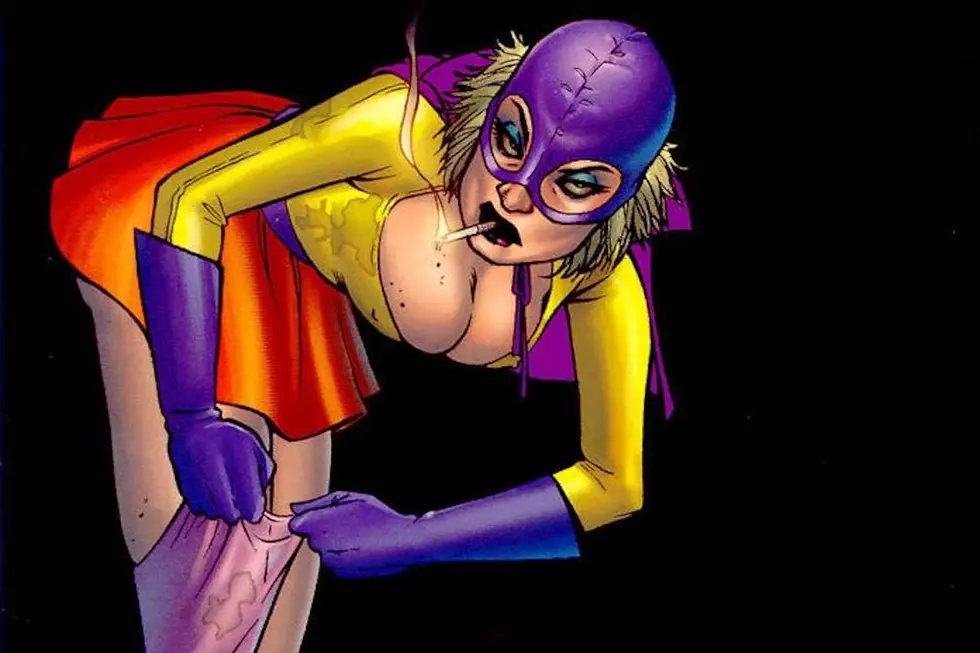
Thought Bubble #6: Is Crowd-Funding Good For Comics?

The comics medium attempts to answer a lot of big questions: Who would win in a fight between the Hulk and Superman? "What lurks behind the beehive?" What's up with the Joker's face? In that spirit, ComicsAlliance's Matt Wilson is asking comics creators, retailers and commentators some big questions of his own.
In this installment, comics creators and editors Erik Larsen, Jimmy Palmiotti and Antony Johnston answer what might just be the big question of 2012: Is crowd-funding good for comics?Back in July, Todd Allen of Publisher's Weekly wrote that observers could conceivably call Kickstarter the second largest graphic novel publisher in the United States, though it would be more like fourth in terms of gross revenue. In the months since then, one can only assume it's edged upward.
Looking at individual projects, this was the year a Kickstarter comics project broke the $1 million donation mark. Very successful webcomics started projects that resulted in major backlash, to the point where Forbes magazine was asking, "Is the crowdfunding bubble about to burst?" Major publishers even got in on the act.
Kickstarter, and to a lesser degree, other platforms such as Indiegogo, are a fact of comics life now, as evidenced by our own Aaron Colter's ongoing Crowd-Funding Watch feature. Could that end up being a problem? Our panelists weighed in.
 Jimmy Palmiotti, Co-creator of Sex and Violence and several other Kickstarter-funded projects
Jimmy Palmiotti, Co-creator of Sex and Violence and several other Kickstarter-funded projects
[Crowd-funding] is great for comics because it connects the audience directly with the die-hard fans of a person's work. It gives the creators some idea of their market and what they can or cannot do. The Kickstarter projects we have done are things that, normally, a regular publisher wouldn't pay us for these days. Most of the people want the same books over and over again, so [crowd-funding] gives a creator a chance to branch out of their safe zone and get experimental. With Sex and Violence Volume One, for example, there is no publisher in their right mind that would fund this book because it will never sell enough to pay for the printing, production and distribution. With the Kickstarter, we pay all the talent and are able to get the fans a digital version and an exclusive edition of the book with cool extras that they can't get anywhere else -- like signed prints and original art. As well, we can then give the finished book to someone like Image like, in the case of Retrovirus and Queen Crab, and get it to retailers so they too can make some money.
So in closing, yes! Kickstarter is great for comics and comic fans, and for me, it creates a connection with me and my audience. That is priceless.
 Erik Larsen, creator of Savage Dragon and former publisher of Image Comics
Erik Larsen, creator of Savage Dragon and former publisher of Image Comics
I think [crowd-funding] is very good for comics. The traditional distribution system has its advantages, but it has its drawbacks as well. Retailers are deciding what they think their customers may want in a few months' time and while some have a decent communication system with their customers, many do not and they are reluctant to take a risk on something odd or unfamiliar.
There's also a cost factor. The distributor and retailers take a huge cut of the profit, which makes some projects simply unviable. I know that in my own case I wanted to do a hardcover version of Herculian, a book I had published, and the cost of printing was so high and the cut I would need to give to [direct market comics distributor] Diamond and retailers was so much that the book would have to retail for $20. Selling that same book directly to fans at conventions, however, has made it possible for me to sell it for half that. There are projects through Kickstarter that are in that same boat. If they were distributed through the regular channels, they might not be able to see the light of day. Kickstarter makes it possible for certain projects to exist and that's a good thing.
The bad part of the [crowd-funding] system is that it circumvents traditional stores and that doesn't help them. If every book went that route, stores would be in serious trouble, but that's unlikely to happen. Readers can circumvent stores anyway through Amazon books, digital and subscription services. There are a few factors, but overall I think it's a good thing.
 Antony Johnston, co-creator of Oni Press' Wasteland and co-writer of the video game Dead Space
Antony Johnston, co-creator of Oni Press' Wasteland and co-writer of the video game Dead Space
Yes.
There are lots of caveats around that answer, of course. With every creative medium, it seems there's a risk of Kickstarter burnout after the first couple of waves of interest. There's always the risk that people won't fulfill their promises and perks, for one reason or another; uncompleted projects are hardly a rarity in comics. And there's the further risk of public backlash, of people requesting too much money for too little work, and comics creators consequently being branded greedy by our unusually watchful audience.
But look at the similar funding boom around video games, which was kickstarted -- sorry -- by Double Fine smashing a bunch of Kickstarter records, and it's becoming clear that the audience there is funding nostalgia: sequels to old classics; remakes of old classics; new, similar games by the people who made old classics, just like the Double Fine project itself. I'm not saying this is bad, but in that medium, people are gravitating towards things they already know. That's not the case with comics Kickstarters, which by itself is cause for celebration. The mainstream comics market has great trouble finding audiences for new, original books by unknown creators. But on Kickstarter, so far removed from the traditional comics market, people are funding new books and new creators. That's tremendously exciting.
The more new, original comics get funded (and actually released) because of Kickstarter, the better our medium will be for it. The more young creators get funded through Kickstarter, the better and healthier our medium will be for it. When creators realize there's an audience for their original work, and the audience realizes there are creators making original work they want to read, everybody wins.
Thanks to everyone for their thoughtful contributions. And now we put the same question to ComicsAlliance readers. Is crowd-funding good for comics?
More From ComicsAlliance
![How Conner And Palmiotti Reinvigorated Harley And Reimagined ‘The Jetsons’ [Interview]](http://townsquare.media/site/622/files/2017/03/Harley-Featured.png?w=980&q=75)

![Kamandi Skips The Con, But Still Has A Weird Time In San Diego In ‘The Kamandi Challenge’ #3 [Exclusive]](http://townsquare.media/site/622/files/2017/03/Kamandi00.jpg?w=980&q=75)
![The Cats Deserve Their Fame: Ananth Hirsh and Yuko Ota Dive Back Into ‘Johnny Wander’ [Interview]](http://townsquare.media/site/622/files/2017/03/JWOMNI-COVER-ONI-PRESS-EDITION-4x6-COMP-CA-FEATURED-IMAGE.jpg?w=980&q=75)
![Steven Andrews Offers a Tour Of Toronto In ‘Yonge at Heart’ Anthology [Back Pages]](http://townsquare.media/site/622/files/2017/03/yongeatheart-feat.jpg?w=980&q=75)



![Hanging Out With Flair, Being Best Friends With ‘The King': Mike Kingston’s Absurd Journey to ‘Headlocked: The Hard Way’ [Interview]](http://townsquare.media/site/622/files/2017/03/HTHW-Promo-2.jpg?w=980&q=75)
